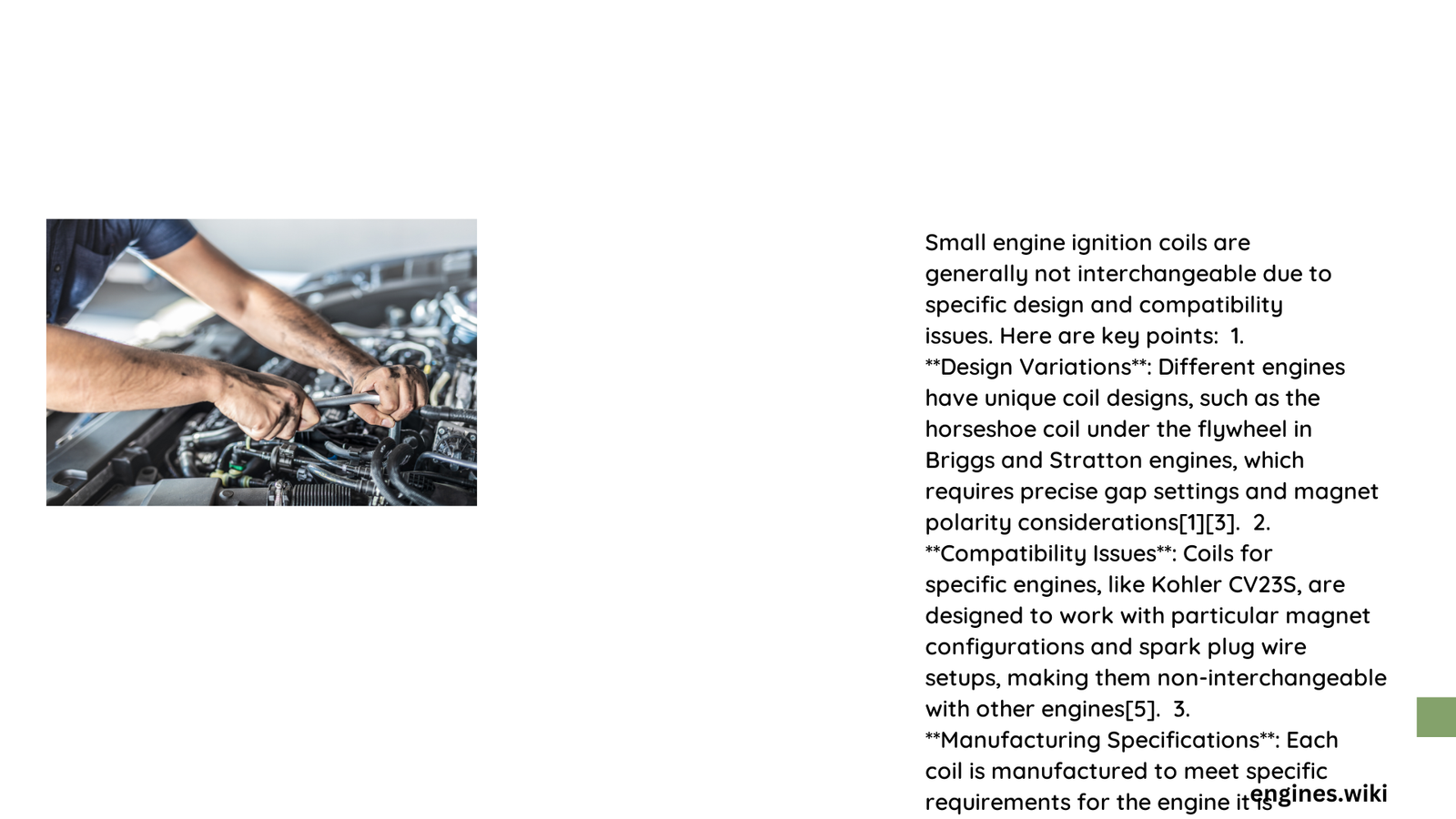Small engine ignition coils are not universally interchangeable, as their compatibility depends on multiple precise technical specifications. Mechanics and DIY enthusiasts must carefully evaluate voltage ratings, resistance values, physical dimensions, mounting configurations, and specific engine requirements before attempting to replace an ignition coil. Understanding these nuanced factors prevents potential engine damage and ensures optimal performance across various small engine applications.
What Determines Ignition Coil Compatibility?
Can Voltage Ratings Impact Interchangeability?
Voltage requirements play a crucial role in determining whether ignition coils can be swapped between engines. Different engines demand specific voltage outputs to generate proper spark:
| Engine Type | Typical Voltage Range | Spark Gap Requirement |
|---|---|---|
| Lawn Mowers | 10,000 – 15,000 volts | 0.025″ – 0.035″ |
| Small Generators | 8,000 – 12,000 volts | 0.020″ – 0.030″ |
| Small Tractors | 12,000 – 18,000 volts | 0.030″ – 0.040″ |
How Do Resistance Values Affect Coil Replacement?
Resistance measurements are critical when assessing ignition coil interchangeability. Technicians must verify:
- Primary Coil Resistance: Typically ranges between 0.5 – 1.5 ohms
- Secondary Coil Resistance: Generally falls between 2,500 – 5,000 ohms
- Exact Match Requirements: Deviation beyond 10% can cause performance issues
What Physical Factors Prevent Direct Replacement?
Several physical characteristics limit ignition coil interchangeability:
- Mounting bracket dimensions
- Wire connector types
- Flywheel magnet alignment
- Coil height and orientation
- Electrical connection interfaces
Can Different Brands Share Ignition Coils?
Brand-specific considerations include:
- Tecumseh Engines: Unique coil specifications
- Briggs & Stratton: Proprietary design elements
- Honda: Precise engineering tolerances
What Tools Help Verify Coil Compatibility?
Essential diagnostic tools include:
- Digital multimeter
- Ohmmeter
- Spark tester
- Manufacturer specification guides
Practical Replacement Recommendations

How Should You Approach Ignition Coil Replacement?
Step-by-Step Verification Process:
- Measure existing coil resistance
- Compare physical dimensions
- Check voltage specifications
- Verify mounting configuration
- Consult manufacturer documentation
What Risks Exist with Incorrect Coil Selection?
Potential consequences of improper replacement:
- Reduced engine performance
- Intermittent spark generation
- Premature component failure
- Potential electrical system damage
Cost and Availability Considerations
Where Can You Source Compatible Ignition Coils?
Recommended purchasing channels:
- Original equipment manufacturer (OEM) suppliers
- Authorized engine parts distributors
- Specialized online marketplaces
- Local small engine repair shops
What Price Range Should You Expect?
Typical Pricing Breakdown:
- Budget aftermarket coils: $15 – $30
- Mid-range replacement coils: $30 – $60
- High-performance specialized coils: $60 – $120
Final Recommendations
While some ignition coils might appear similar, precise matching remains essential. Always prioritize exact specifications over potential cost savings.
Pro Tips:
- Never assume interchangeability
- Always measure and compare specifications
- Consult professional technicians for complex replacements
Reference:
– Briggs & Stratton Technical Documentation
– Small Engine Repair Resources
– Tecumseh Engine Specifications Guide
